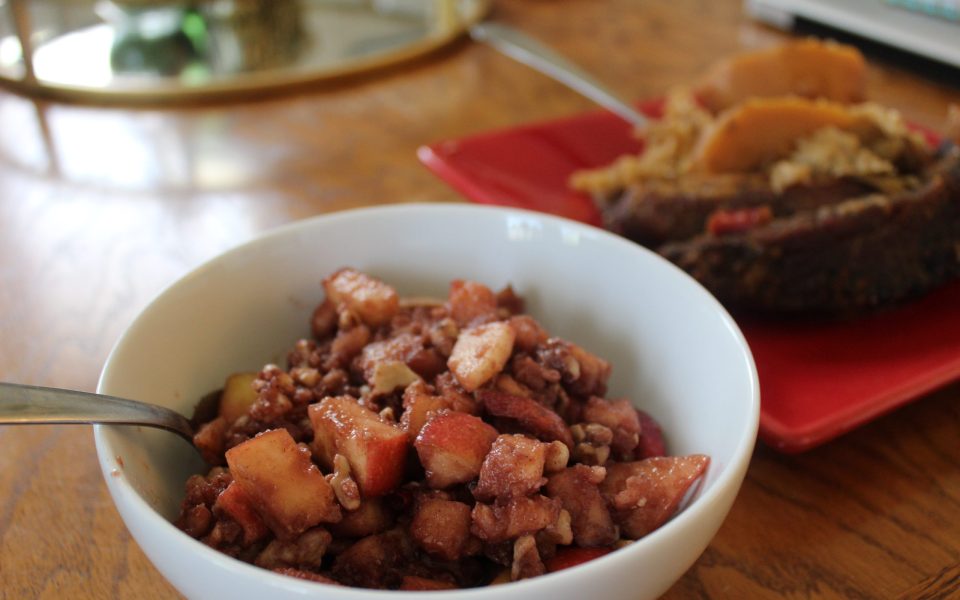The Jewish holidays make me miss home.
Monday night, while they were gathered around the table at my parents’ house for a Passover seder, I added red pepper flakes to my pasta shaped like six-pointed Jewish stars — a decidedly inappropriate dish for the holiday, and a holdover from Hanukkah that also featured dreidel shapes, if we’re being honest — before clicking on the latest episode of “Empire.”
I haven’t been home to Boston for Passover since I moved down here at age 18. I’ve held a few seders of my own, with a decidedly more radical political bent than the ones I’d grown up with despite being raised in a Reform congregation. I spent one of my last seders with my family fuming that I hadn’t been allowed to skip the ritual to go to a punk show — the holiday runs for more than one evening, after all.
Seders with friends have served as no substitute. I feel kinship with other Jews, certainly, as evidenced by my small talk with someone shopping for Passover ingredients next to me at Harris Teeter this week. But I generally pass on invitations to celebrate Jewish holidays down here — this may never feel like my Jewish community.

©
It hasn’t felt all that important to go home for Pesach — or Passover — in the past, so I made no plans to attend this year. I always liked the spirit of the holiday with its liberation-themed message, but it always took so damn long to read through the Haggadah and get to the eating part. Maybe it’s because I didn’t visit this year around Hanukkah, which I usually do, but messaging with my mom on Monday night felt like transmitting messages for a foreign outpost, her just waiting for me to finally come home and me wondering why I wasn’t there next to her, eating some of her tzimmes.
Food would be my only stand-in. For lunch, I grabbed a Jewish friend and ate lox and cream cheese on a bialy, something that has nothing to do with Passover but everything to do with my Jewish identity. I finally cracked open Jewish Slow Cooker Recipes: 120 Holiday and Everyday Dishes Made Easy, a cookbook I’ve owned for about a year, and set out to buy ingredients.
Like Hanukkah when I asked for her sweet potato latke recipe, I reached out to my mom for guidance. But I’d been a vegetarian for the last five years living at home, and her offer of a recipe for Cornish hens didn’t conjure any feelings of nostalgia or belonging.
I knew I’d make charoset — a mandatory Passover side symbolizing the mortar between the bricks that Jewish slaves used to build the pyramids — both because I love the sweetness of the apple, walnut, wine, cinnamon and sugar-based dish and because the instructions are quite literally to chop the apple and stir the measured ingredients together in a bowl. I’ve been making swift work of charoset since the days when I considered Easy Mac cooking.
This year I subbed out Manischewitz wine — a company with dubious ethics — for a $5 cabernet sauvignon I found, and its sweetness did the trick. Oh, and drizzled honey on top, maybe because the Rosh Hashanah duo is one of my Jewish faves.
I wanted to push myself a little, and though it wouldn’t compare to my grandmother’s brisket — a dish so satisfying I wouldn’t want to sully its name by attempting a clone — I picked a slow-cooked corned beef dish with a pile of veggies and a brown sugar glaze.
Jewish Slow Cooker Recipes author Laura Frankel didn’t include classic Ashkenazi Jewish Passover meals in her cookbook, instead proposing personal favorites like this one. She, no doubt, cooks it for her family or friends, and imagined readers like me doing the same. But even with a supportive girlfriend, I had no use for seven pounds of corned beef, so I procured a third of all the portions Frankel called for, omitting ground cloves because the tiny container I found was going for more than $8.
I didn’t want to impress myself that much.
As the smell of the simmering ingredients filled my house, I began to daydream about the mixture of spices, corned beef and vegetables. And when I finally bit in for lunch on Tuesday, it tasted better than I’d anticipated.
But I still felt sort of like an impostor, the guy whose necklace with a Jewish star pendant broke years ago and keeps making excuses for why it isn’t fixed. And I felt like an outsider too, despite my proximity to a Hebrew academy, knowing a couple local rabbis and counting plenty of Southern Jews as friends. Some of them would react the same way Christians do when met with someone who planned to spend Christmas alone, inviting me in to their seder and likely offering me Elijah’s cup.
The way I “celebrated” Passover is certainly nontraditional. But it also feels strangely proper to the diasporic experience of Jews. Unlike some of my ancestors, though, I don’t think I’ll have to wander in the desert for 40 years before I feel at home at a seder.
I just might have to go back to Boston.

Join the First Amendment Society, a membership that goes directly to funding TCB‘s newsroom.
We believe that reporting can save the world.
The TCB First Amendment Society recognizes the vital role of a free, unfettered press with a bundling of local experiences designed to build community, and unique engagements with our newsroom that will help you understand, and shape, local journalism’s critical role in uplifting the people in our cities.
All revenue goes directly into the newsroom as reporters’ salaries and freelance commissions.


Leave a Reply